
8 Benefits of Negating Singular Terms in Google Ads Ecommerce
Keyword tense & form may be killing your profit
Like it or not, Google Keyword Planner is never going to reveal the difference in search volume between singular and plural search terms. And no matter what match type you use in AdWords, your ads will serve for close variants of your product keyword. What this means for your PPC strategy for Ecommerce is that ads can show for both singular and plural product searches—and this could be killing your sales performance.
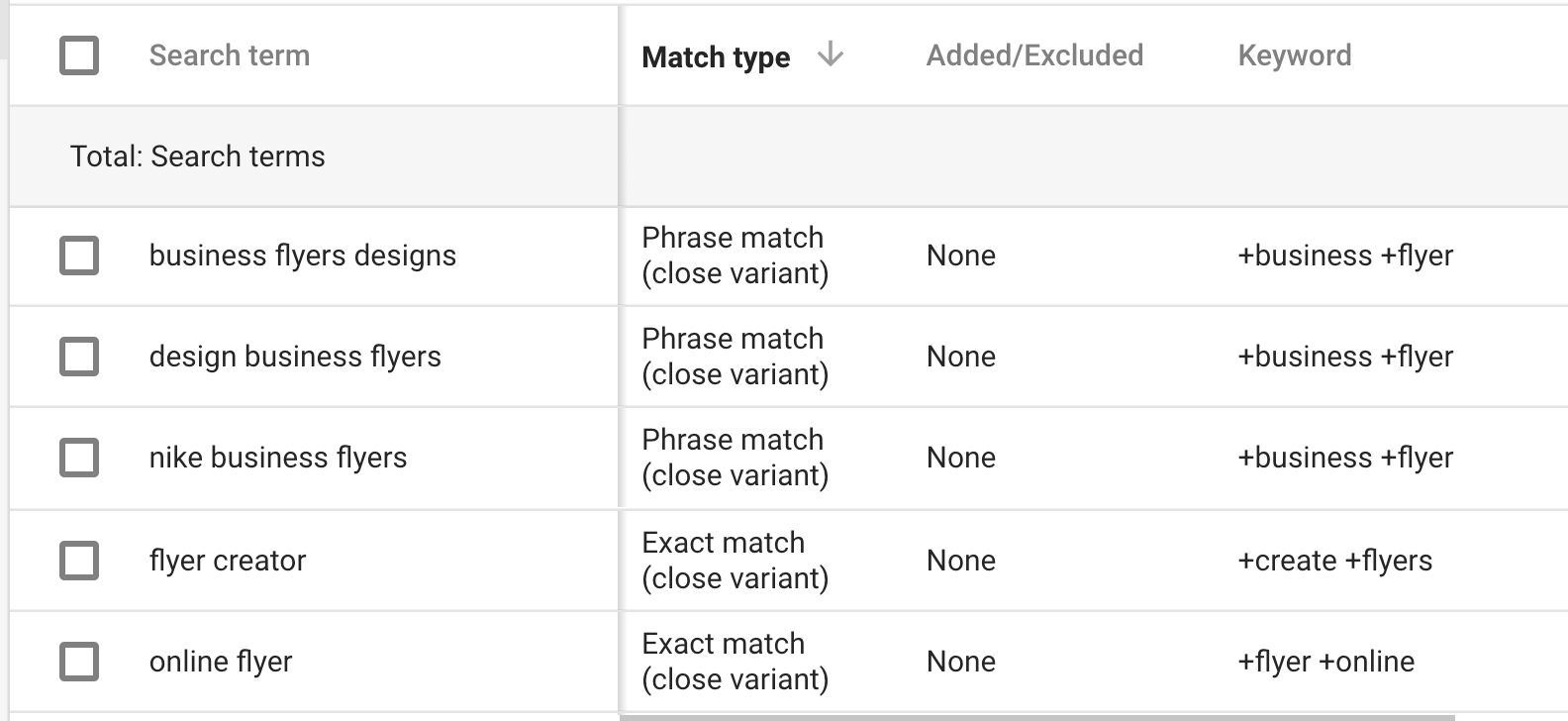
Search term filtering can confirm if one product variation outperforms another. For example, one of the quickest ways to evaluate singular searches is to compare using search term contains “flyer” with search term does not contain “flyers.”
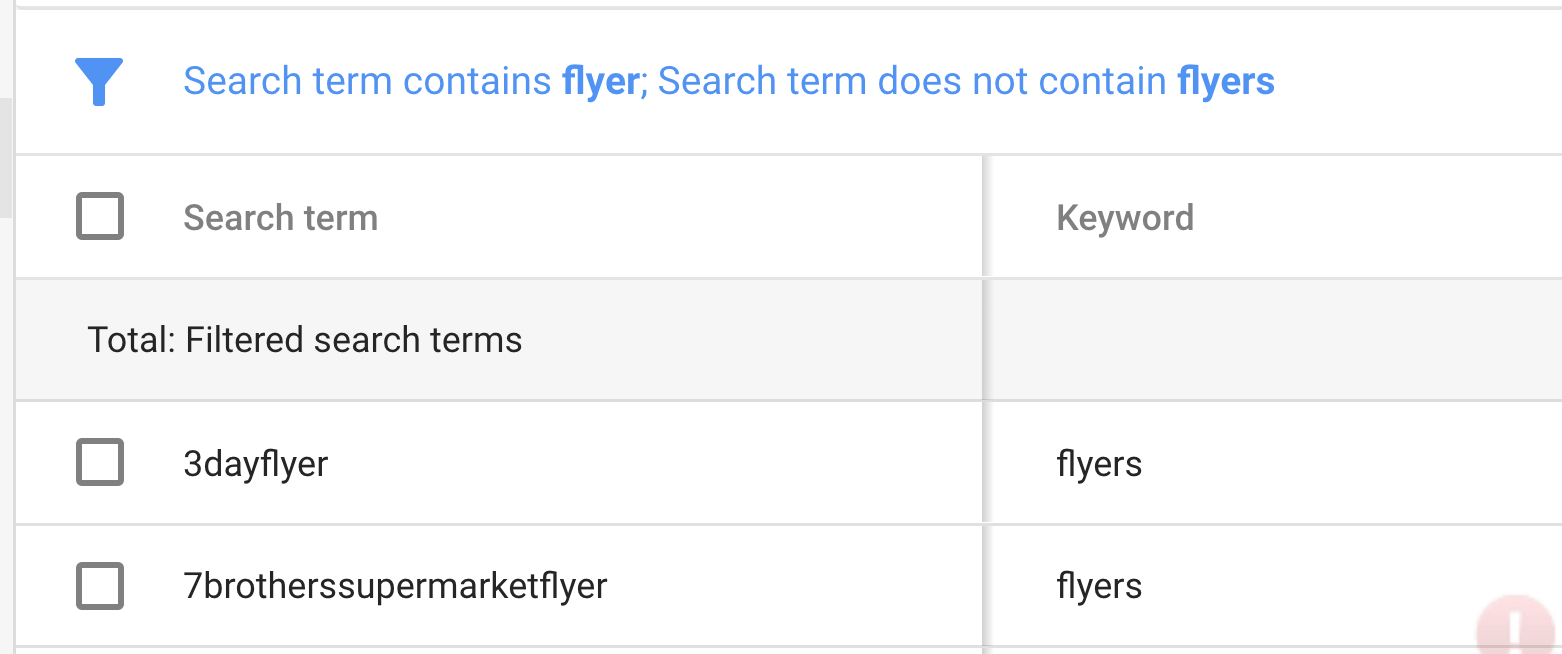
Consumer intent can vary greatly between singular and plural product searches. If you’re spending big bucks on AdWords and getting no return, you may want to consider negating the singular variants of your product keywords. Ecommerce PPC management is one area where being a Negative Nancy is good…
Negative phrase match settings don’t block close variants
Negative phrase match settings do not block your ads from serving close variants of the negative keyword. Google wants to show your ads in as many places as possible, so it will block only the singular form of a keyword used in a negative phrase match. This means keyword conflicts do not occur when applying singular product negatives—Google will continue to show your ads for the available forms of your keyword.
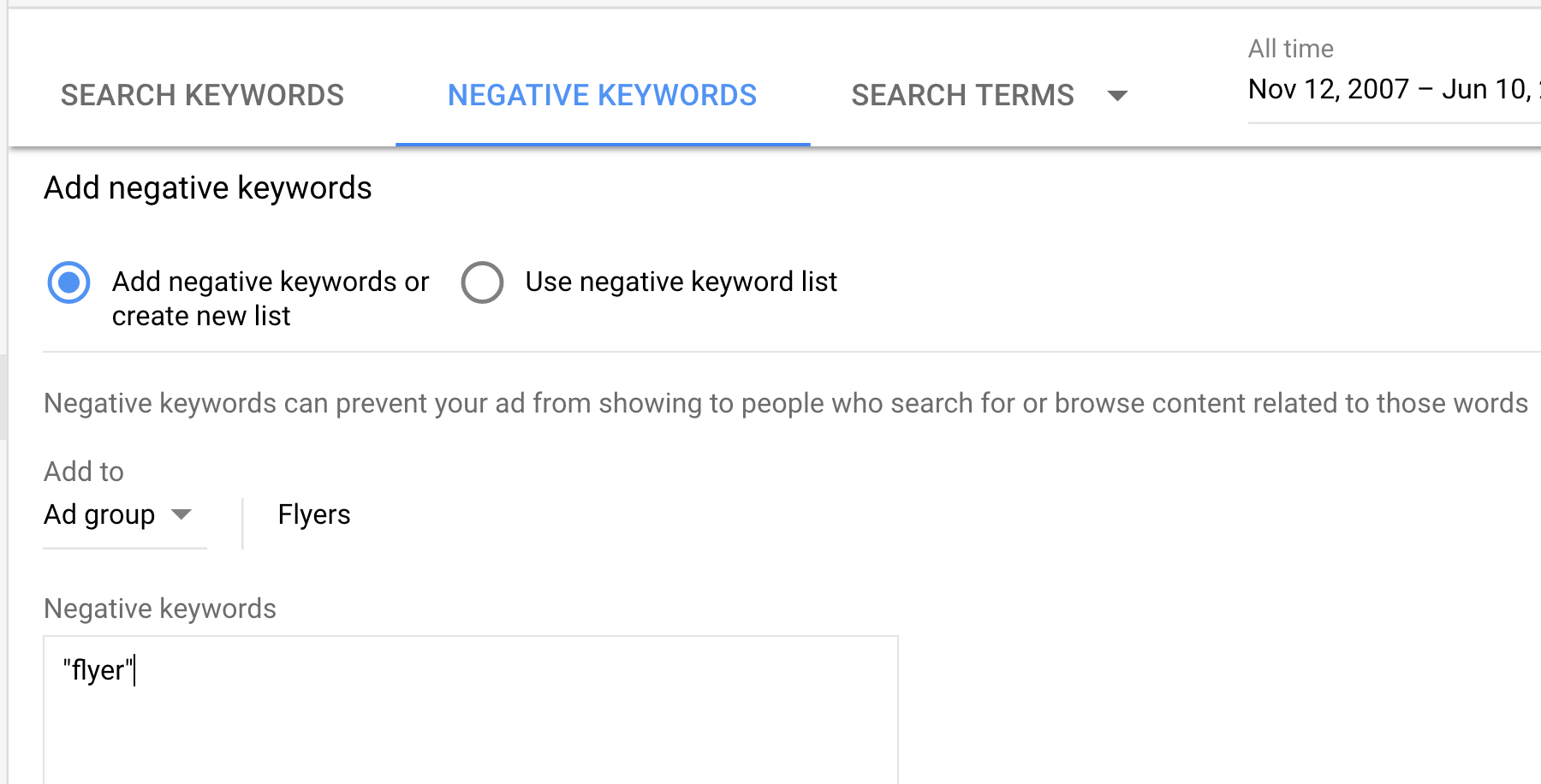
Showing ads exclusively for plural searches could make or break your ROI in the B2B industry. Here are eight AdWords inside secrets on why blocking your ads from single product searches can improve performance.
1. You’re shifting budget from low-intent to high-intent clicks
One of the highest-spending products I’ve managed ads for is letter mailing services. After digging through a particular client’s search terms, I discovered that more than $4,000 had been spent on searches for singular letter creation and mailing services. During this same time, searches for the plural form, letters, accounted for only $862.
Moreover, “letter” search terms brought nearly 4,100 clicks, while “letters” brought only 350. When comparing search term intent, it was clear that searches for the singular “letter” included a large number of B2C users who weren’t ready to purchase. These singular searches also revealed some confusion with other letter products that our client did not offer. Meanwhile, searches with “letters” included B2B users with large-order intent and no product confusion.
2. A smaller pool of searches can offer a better cost per lead
For the same client, impressions for search terms containing “postcard” reached 55.3K, while its plural counterpart, postcards, saw only 34.5K impressions in the same timeframe. The lower number of impressions for postcards contributed to the plural keyword’s overall 54% lower cost per lead. In this case, higher-value clicks came from a smaller, more exclusive group of searches.
3. Lead quality improves significantly
Misspellings and spacing errors tend to be more common in singular product inquiries. Click-through rate can be inflated by these low-quality searches that arise from single product interest.
Since it’s impossible to predict all the ways a user might misspell searches for your product, negating the singular form may very well solve the problem. With our letter mailing client, positioning ads for plural product searches has led to prospects lower in the sales funnel who want to mail flyers to thousands of clients, send 50,000 postcards, and order 100 realtor postcards.
4. You’re conserving enough budget to bid higher than your competitors
If you suspect you’re being outbid by competitor keywords that dominate impression share, you now have an Ecommerce AdWords strategy that works against their seemingly unlimited budget. In the case of the “letter” example we looked at earlier, the plural variant accounted for only 3.2% of the search volume. Removing ads from the other 96.8% eliminated almost all possibility of irrelevant search terms wasting ad spend.
With that particular client, focusing on a small portion of real-time search volume allowed us to set keyword bids unusually high. Refining our search requirements much further than competitors allowed us to rank with an average ad position of 1 for extremely qualified user searches.
5. Ecommerce PPC management time is cut in half (or more)
Each negative that we added for a singular product search reduced incoming search term traffic 40–90%. As a result, evaluating search term intent became a much faster process, since the frequency of ad impressions and user clicks took place in a controlled environment. Account maintenance time was easily cut in half, allowing us to devote more time to new and supporting campaign strategies.
6. An uptake in conversion rate isn’t out of reach
Singular product searches can generate a high number of irrelevant clicks. It’s more common for user intent to misalign with marketing intent, as a higher search volume tends to have higher margin for error. Though you may be seeing more conversions overall (with questionable intent), your conversion rate is likely suffering from excessive clicks, unnecessary costs, and unpredictable search terms and product types that are difficult to negate.
Search volume focused on large product orders doesn’t just mean fewer clicks—it also means more qualified clicks. So even though your clicks are fewer and further between, the unqualified junk has been eliminated, and there is a higher likelihood that the clicks you do receive will convert.
7. Keyword match types can be a little less strict
Test modified broad keywords. The stronger your negative keywords, the more open your keyword match types can be. This is an ideal strategy for testing new keywords and acting on valuable search terms. With this strategy, we’re essentially flipping on its head the traditional sense of using long-tail keywords for a narrowly defined search volume.
In today’s oversaturated arena of keyword competition, this strategy could be just what you need to outsmart competitors. Leveraging match types to both include and exclude keyword form or keyword tense is traditionally thought to cause a keyword conflict. But understanding how to position those close variants and other slight keyword deviations can be incredibly effective.
8. Your impression share is higher in competitive ad environments
Look at your Adwords auction insights and see where your impressions stand against those of your competitors. If you apply singular negatives, you’ll likely have a higher top-of-page rate and impression share than before.
Also, review competitive metrics to see if your impression share lost due to rank or budget has decreased. Your overall impression share may have increased when compared to the previous period. In this case, refining ad placement can lead to a better average position overall.
Best practices for testing singular versus plural keywords
Nothing’s better than having clean data for both singular and plural product searches. I recommend filtering singular search terms through one ad group and plural search terms through another. Apply the singular product negative to the first ad group and the plural product negative to the second. This allows you to assess singular product searches alongside larger order interest in real time.
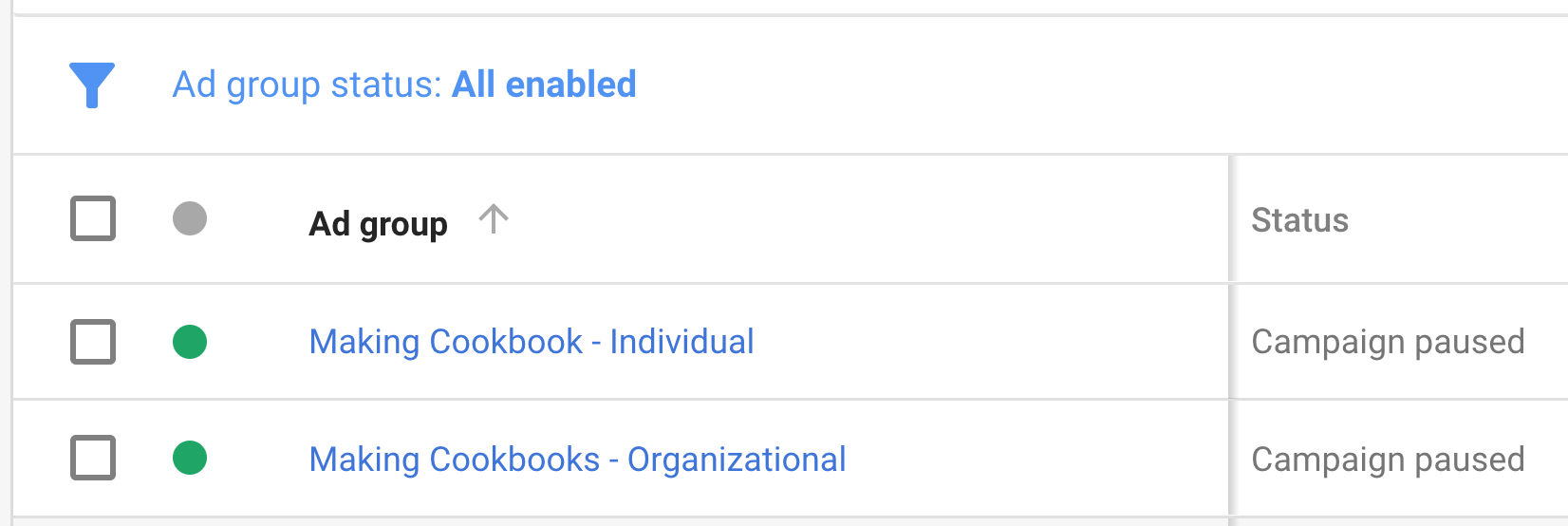
My next recommendation is to pluralize keywords and ad copy for the ad group focused on plural search terms. Aside from these minor changes, the ad groups should be the same. Keywords and ad copy should not differ between ad groups—if they do the test may be invalid.
Of course, every great strategy has exceptions. Some product keywords may have only one correct tense within a term. For example, “letter mailing service” has search value, but it only makes sense to use “letter” in its singular form. It’s best to identify these search terms and isolate them in their own ad group or campaign. Only test keywords where form is interchangeable, such as with “mail letter” and “mail letters.”
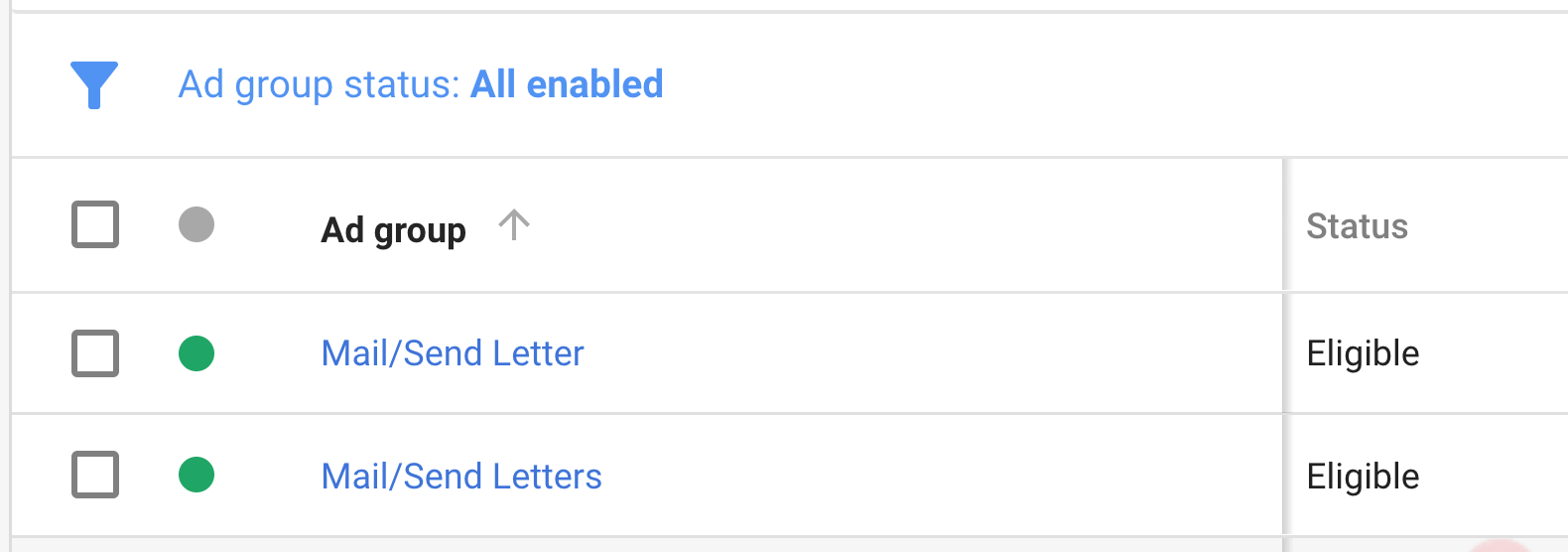
Naturally, as you work towards securing higher lead quality, you’ll likely see fewer leads in general. Negating close variants is very cost effective, but you should expect the frequency of leads and qualifying search volume to change. If test results indicate that you should block singular product searches, prepare your coworkers and clients for the data changes to come.
Cost-efficient takeaways
A product can only be searched in one of two forms, plural or singular, but leads may not be turning into sales for both. Close variant negatives can help position your ads for the higher qualified of these two audiences while saving tons of time and money.


Evaluating close variants should be a baseline test for Google AdWords Ecommerce products running in search campaigns on AdWords or Bing. Filter through your search terms and see if close variant testing is right for your product. Depending on your industry, product and audience, there could be psychological reasons that account for users searching one way versus another.
With these AdWords secrets revealed, you’ll have an advantage over competitors in the Ecommerce world. What are your thoughts on singular product searches and your current PPC strategy for Ecommerce? Let us know in the comments!
Read about the 7 ways to increase Google Ads impression share and ROI
View all posts filed under “PPC”
Most newsletters suck...
So while we technically have to call this a daily newsletter so people know what it is, it's anything but.
You won't find any 'industry standards' or 'guru best practices' here - only the real stuff that actually moves the needle.







